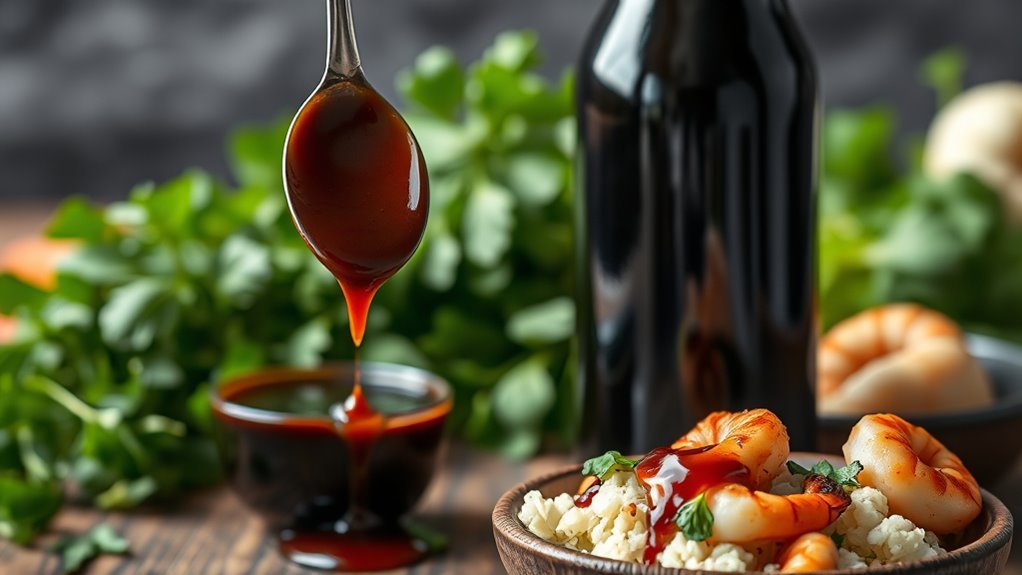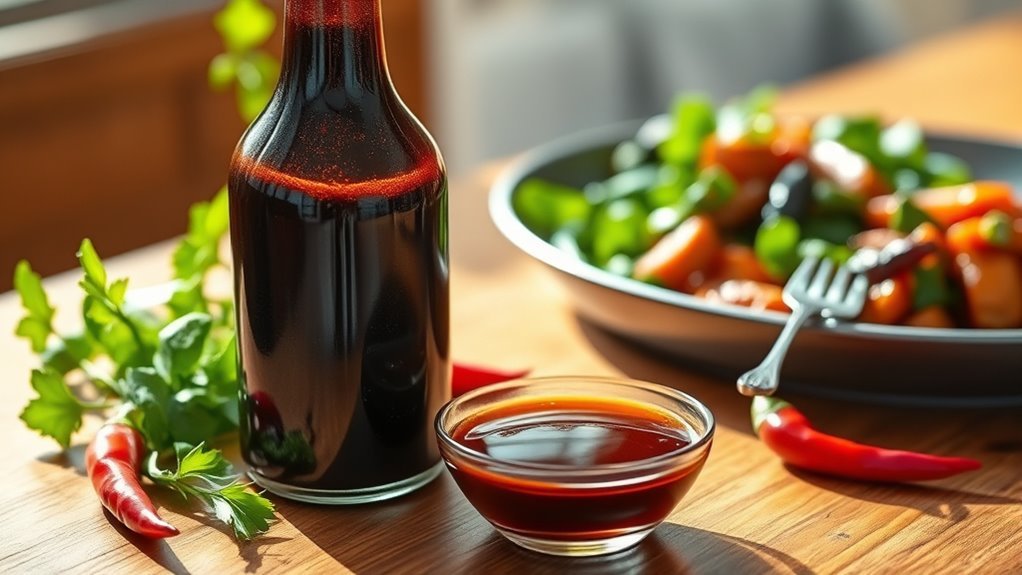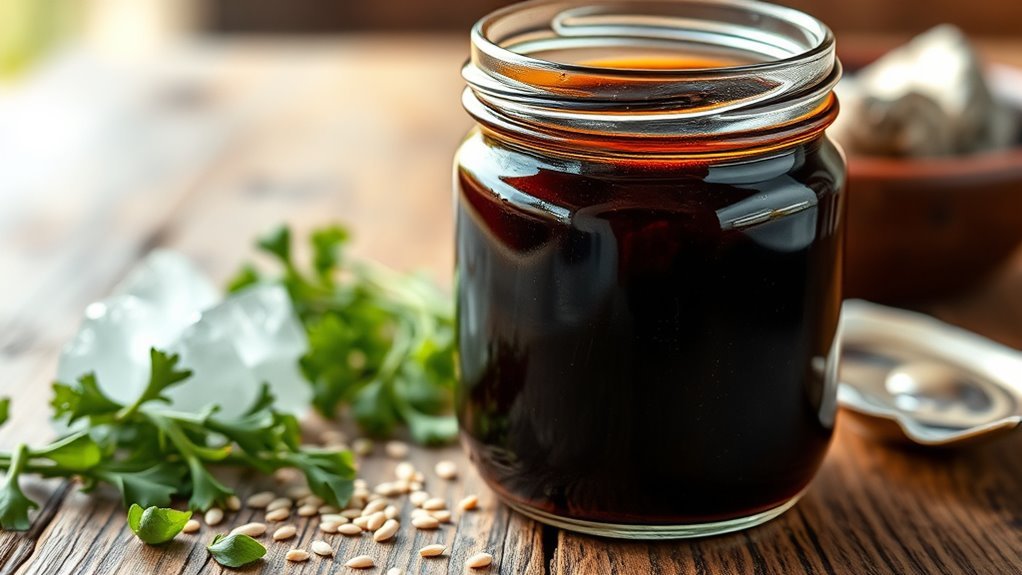Oyster sauce can fit into your keto diet, but you need to be mindful of portion sizes. With about 3-5 grams of carbohydrates and 1-2 grams of sugar per tablespoon, it’s important to monitor your intake to avoid exceeding your carb limits. While it adds great flavor, it can impact blood sugar levels. If you’re looking for alternatives or tips on using it to stay within your keto goals, there are plenty of options to contemplate.
Nutritional Profile of Oyster Sauce

When you consider incorporating oyster sauce into your diet, it’s important to understand its nutritional profile. This sauce is low in calories, typically containing around 9 calories per tablespoon, making it a flavorful option without significant caloric burden. Its primary nutritional benefits include small amounts of protein and a modest sodium content, which can enhance dishes while providing umami flavor. The flavor profile is rich and complex, combining sweetness and saltiness, which can elevate your meals. However, keep in mind that its sodium content can be high, so moderation is key. For those looking for a burst of flavor without excessive calories, oyster sauce can be a delicious addition to your culinary repertoire, aligning well with a balanced diet.
Ingredients in Oyster Sauce

Oyster sauce is made from a combination of several key ingredients that contribute to its unique flavor and texture. Understanding these oyster sauce ingredients can enhance your culinary experience and help you appreciate its complex flavor profile.
Oyster sauce combines key ingredients that create a unique flavor, enhancing your culinary experience with its complex profile.
- Oysters: The primary ingredient, providing a rich umami taste.
- Soy Sauce: Adds saltiness and depth, balancing the sweetness.
- Sugar: Enhances the overall flavor, giving it a slight sweetness.
These ingredients work together to create a savory sauce commonly used in Asian cuisine. When you incorporate oyster sauce into your dishes, you’re not just adding flavor; you’re enriching your meals with layers of taste that elevate your cooking. Enjoy the freedom to experiment with this versatile condiment!
Carbohydrate Content and Sugar Levels

When considering oyster sauce, it’s essential to look at its carbohydrate content and sugar levels. Typically, a tablespoon contains around 3-5 grams of carbs, primarily from added sugars. Understanding these figures can help you determine if it fits into your keto diet, especially when factoring in serving sizes.
Nutritional Breakdown of Oyster Sauce
Exploring the nutritional breakdown of oyster sauce reveals important insights into its carbohydrate content and sugar levels. While it’s commonly used for its rich, umami flavor in various dishes, understanding its nutritional profile is essential for those on specific diets.
- Carbohydrates: Oyster sauce typically contains around 5-10 grams of carbohydrates per tablespoon.
- Sugars: Expect about 1-2 grams of sugar, which contributes to its sweet taste.
- Health Benefits: Packed with minerals, oyster sauce can enhance your meals while providing some nutritional value.
When used sparingly, oyster sauce can fit into a balanced diet, offering flavorful culinary uses without derailing your health goals. Just be mindful of portion sizes to maintain your desired carbohydrate intake.
Comparing Sugar Levels
While many sauces can vary considerably in their sugar content, oyster sauce generally maintains a moderate level of carbohydrates, which is essential for those monitoring their intake. Typically, it contains around 6-8 grams of carbs per tablespoon, making it less than ideal for strict keto dieters. If you’re looking for keto-friendly sauces, consider those made with sugar substitutes like erythritol or stevia, which can provide similar flavors without the added sugars. These alternatives allow you to enjoy savory dishes without compromising your low-carb lifestyle. Always check labels for hidden sugars, as even small amounts can add up. By choosing wisely, you can still savor delicious meals while sticking to your dietary goals.
Serving Size Considerations
Understanding serving size is essential for managing your carbohydrate intake, especially when it comes to sauces like oyster sauce. To maintain portion control, consider the following:
- Typical Serving Size: A standard serving is often about one tablespoon, which contains around 2-3 grams of carbs.
- Flavor Intensity: A little goes a long way—just one tablespoon can enhance dishes without overwhelming carb counts.
- Meal Pairings: Combine oyster sauce with low-carb vegetables or proteins to keep the overall meal keto-friendly.
How Oyster Sauce Affects Ketosis
When considering how oyster sauce affects ketosis, it’s essential to analyze its carbohydrate content, as even small amounts can impact your state of ketosis. Specifically, the sauce can influence your blood sugar levels, which might hinder your ability to maintain ketosis. Fortunately, there are alternative sauces available that can fit better within a ketogenic diet.
Carb Content Analysis
Although oyster sauce can add depth to your dishes, it’s crucial to bear in mind its carbohydrate content if you’re aiming to maintain ketosis. This sauce typically contains about 8-9 grams of carbs per tablespoon, which can quickly add up. Here are three things to reflect on:
- Hidden Carb Sources: Many sauces, including oyster sauce, can contain sugars that contribute to overall carb intake.
- Portion Control: Using small amounts can help you enjoy flavor without exceeding carb limits.
- Keto Substitutes: Contemplate alternatives like soy sauce or coconut aminos, which are lower in carbs and can provide a similar umami flavor.
Keep these factors in mind to guarantee you’re supporting your keto lifestyle effectively.
Impact on Blood Sugar
The carbohydrate content in oyster sauce can greatly impact your blood sugar levels, which is a critical consideration for those on a keto diet. Consuming oyster sauce may lead to an increase in blood glucose, triggering an insulin response that can disrupt ketosis. Understanding how this sauce affects your body can help you make informed choices.
| Component | Amount (per 1 tbsp) | Impact on Blood Sugar |
|---|---|---|
| Carbohydrates | 3-4 grams | Moderate |
| Sugar | 1-2 grams | Significant |
| Sodium | 500-600 mg | Indirect (thirst) |
| Protein | 0-1 gram | Minimal |
| Fat | 0 grams | None |
Alternative Sauces Available
While oyster sauce can add depth to many dishes, its carbohydrate content can hinder your progress on a keto diet. Fortunately, there are low carb alternatives that can keep your meals flavorful without knocking you out of ketosis. Here are three keto-friendly sauces you might consider:
- Soy Sauce – A classic, low in carbs, and perfect for marinades or stir-fries.
- Coconut Aminos – A sweet, soy-free option that’s low in carbs and adds a unique flavor.
- Fish Sauce – Rich in umami, this sauce offers depth without the carbs, ideal for Asian-inspired dishes.
Alternatives to Oyster Sauce for Keto Dieters
If you’re following a keto diet and need a substitute for oyster sauce, there are several flavorful alternatives that won’t kick you out of ketosis. Soy sauce or tamari can be excellent keto-friendly substitutes, offering a similar umami flavor with low carb options. Another choice is a mix of soy sauce, a splash of vinegar, and a pinch of sweetener like erythritol, which mimics the sweetness of oyster sauce. Coconut aminos is a great low-carb alternative as well, providing a sweeter and milder taste. You might also consider making your own sauce by combining fish sauce, sesame oil, and a sugar substitute for a unique twist. These options let you maintain flavor while sticking to your keto lifestyle.
Tips for Using Oyster Sauce on a Keto Diet
When incorporating oyster sauce into your keto diet, it’s essential to be mindful of portion sizes due to its carbohydrate content. This savory flavor enhancer can elevate your keto recipes, but moderation is key. Here are some tips to enjoy oyster sauce while staying within your carb limits:
- Use as a Marinade: Combine oyster sauce with olive oil and garlic to marinate meats and enhance their flavor.
- In Stir-Fries: Add a small amount to keto-friendly vegetable stir-fries, like zucchini or bell peppers, for added depth.
- Flavor Your Sauces: Mix it into homemade sauces or dressings to boost flavor without overwhelming carbs.
Conclusion: Is Oyster Sauce Worth It on Keto?
Is oyster sauce worth incorporating into your keto diet? It can be, but with caution. While it adds depth to your keto meals, traditional oyster sauce contains sugars that may not align with strict keto guidelines. If you’re looking to keep your carb count low, consider sauce substitutions like soy sauce or tamari, which can provide a similar umami flavor without the added sugars. Alternatively, you might find low-carb or homemade versions of oyster sauce that fit your dietary needs better. Ultimately, it’s about balance—if you enjoy the taste and can account for its carbs, it could be a flavorful addition. Just remember to read labels and adjust your other ingredients accordingly to maintain your keto lifestyle.
Frequently Asked Questions
Can I Make My Own Keto-Friendly Oyster Sauce?
Absolutely, you can make your own keto-friendly oyster sauce! Start with keto substitutions like soy sauce or coconut aminos for the base. Combine these with a bit of garlic, ginger, and a sweetener like erythritol to mimic the original flavor. There are plenty of homemade recipes online that cater to keto diets, allowing you to enjoy delicious meals without compromising your lifestyle. It’s a great way to have control over your ingredients!
Does Oyster Sauce Contain Gluten?
Oyster sauce typically contains a variety of ingredients, including soy sauce, which often has gluten. However, you can find gluten-free options made with tamari or alternative ingredients that still deliver a similar flavor. When checking the label, look for oyster sauce that specifically states it’s gluten-free. If you want to be sure about the ingredients, consider making your own version at home using gluten-free soy sauce for a tailored experience.
Is There a Vegan Alternative to Oyster Sauce?
So you’re on a quest for vegan alternatives to that beloved oyster sauce? Fear not! You can explore a range of vegan substitutes like mushroom sauce or soy sauce mixed with a dash of vinegar. These options mimic the rich flavor profile of oyster sauce without the oceanic touch. They’ll add depth to your dishes, ensuring your taste buds aren’t left feeling deprived. Embrace the freedom to experiment with flavors while staying plant-based!
How Does Oyster Sauce Compare to Soy Sauce on Keto?
When comparing oyster sauce to soy sauce, you’ll find that oyster sauce nutrition often includes higher sugar content, which can impact your keto diet implications. While both sauces can enhance flavor, soy sauce generally has fewer carbs, making it a better fit for a keto lifestyle. If you’re looking to keep your carb intake low, sticking with soy sauce might give you more freedom while enjoying delicious dishes without compromising your dietary goals.
Can Oyster Sauce Be Used in Meal Prep for Keto?
When you’re crafting culinary masterpieces, oyster sauce can be a tempting brushstroke on your canvas. While it adds depth, it’s important to evaluate oyster sauce substitutes to keep your Keto meal ideas on track. Alternatives like coconut aminos can mimic its rich flavor without the carbs. For meal prep, balancing flavor and nutrition is key—experimenting with these substitutes can lead to delicious, Keto-friendly dishes that free your taste buds from monotony.
Frequently Asked Questions about Oyster Sauce and Keto
1. Is oyster sauce keto-friendly?
Oyster sauce is not typically considered keto-friendly due to its sugar content. Most commercial oyster sauces contain added sugars, which can significantly increase the carbohydrate count. On a keto diet, where the goal is to minimize carb intake to maintain ketosis, it’s advisable to use oyster sauce sparingly or look for sugar-free alternatives.
2. What are the carbs in oyster sauce?
The carbohydrate content in oyster sauce varies by brand, but on average, a tablespoon contains about 3-4 grams of carbohydrates, primarily from sugars. If you’re following a strict keto diet, it’s important to account for these carbs, especially if you plan to use oyster sauce frequently in your meals.
3. Can I make a keto-friendly version of oyster sauce?
Yes, you can make a keto-friendly version of oyster sauce by using low-carb sweeteners instead of sugar. A simple recipe involves combining oyster extract, soy sauce or tamari, and a sugar substitute like erythritol or monk fruit sweetener. This way, you can enjoy a similar flavor without the high carb count.
4. How can I use oyster sauce in a keto diet?
If you choose to use oyster sauce while on a keto diet, moderation is key. Use it as a flavor enhancer in stir-fries, marinades, or dips but limit the quantity to minimize carb intake. Pair it with low-carb vegetables and protein sources to maintain a balanced keto meal.
5. What alternatives can I use instead of oyster sauce on keto?
If you’re looking for alternatives to oyster sauce that are more keto-friendly, consider using soy sauce or tamari, as they generally have lower sugar content. You can also try coconut aminos, which are lower in carbs and provide a similar umami flavor. Combining these with a low-carb sweetener can create a suitable substitute for oyster sauce in your recipes.
References
- https://www.healthline.com/nutrition/oyster-sauce
- https://www.ketodietapp.com/Blog/post/2020/11/16/Can-You-Eat-Oyster-Sauce-on-Keto
- https://www.medicalnewstoday.com/articles/324165
- https://www.ncbi.nlm.nih.gov/pmc/articles/PMC7211782/
- https://www.thespruceeats.com/what-is-oyster-sauce-694275
- https://www.verywellfit.com/oyster-sauce-nutrition-facts-4688670


